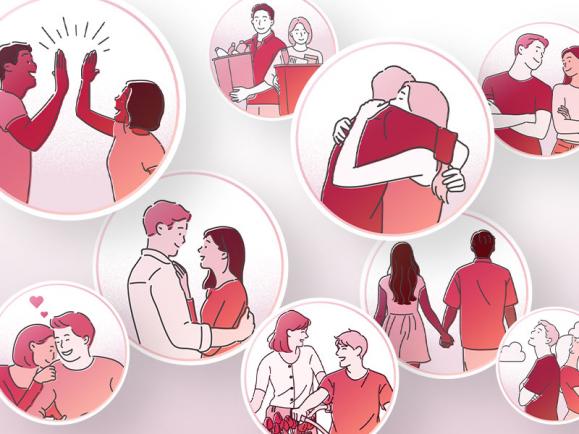
The Coupled Relationship Type Assessment is a typing system that is based on relationship science and was designed by experts in the field of couple relationship psychology to assess the primary areas of connection that makes each relationship unique. While there are many aspects of a couple's interaction that contribute to a healthy relationship, including strong communication, emotional vulnerability, and conflict resolution skills, one area that is important to all couples in how they instinctively connect and bond together.
Couple bonds refer to the aspect of relationships where specific, special connections with each other are found. These are different parts of your relationship where partners feel attracted to each other and where feel like they are on the same page and well-suited for each other. Relationship bonds speak to how we think and identify ourselves as a couple and what makes us different and unique in our relationships. While each relationship is different, these experts have identified several common bonds that couples can possess. The results from the Coupled Relationship Type Assessment helps couples discover the deep bond they share and will help them harness the power of that connection to make it even stronger.
The following are brief definitions of the nine bond types commonly found across relationships.
The Masterminds: Intellectual Bond
Share a “meeting of the minds” and love expressing their ideas and opinions with each other. They form a deep connection and appreciation for each other through engaging conversation and mutual respect. Masterminds tend to build each other’s self-confidence. When someone values and respects our opinion, we tend to get more confident. Mastermind couples excel at building this confidence by provide positive feedback and encourage of each partner’s opinions.
The Best Friends: Emotional Bond
Are “hooked at the heart and soul” with each other. Always sharing their thoughts and feelings with each other and truly embody the trust, companionship and unconditional love of a true best friend. Best Friends are less likely to worry about their relationship than other couples and trust that their partner is fully engaged in the relationship.
The Rocks: Supportive Bond
Are each other’s most trusted confidant – supporting each other through life’s ups and downs. The Rocks usually have better mental health. Validation and support are key parts of having healthy mental health. Couples often have elevated mental health ratings than singles and couples who score high in this category are likely to benefit from this boost.
The Honeymooners: Physical Bond
Respond to the power of touch that puts a romantic spark at the heart of their relationship. The Honeymooners often feel loved by their partners on a daily basis. Acts of intimacy are really expression of love. Because couples who score high in this area often have regular physical connections, they often feel an elevated sense of love in their relationship.
The Rendezvouers: Shared Activities
Are “joined at the hip” – they love to spend every second they can with each other and connect through new adventures and exploring life together. Rendezvouers have a strong sense of couple identity. Healthy relationships are about creating a joint sense of purpose. Spending a lot of time in share activities often helps foster this process.
The Altruists: Intimate Giving Bond
Believe that “actions speak louder than words” when it comes to expressing love through intimate giving and service. Altruists tend to be really good at reading emotions in other people. They track their partners’ mood state and like to lift their partner up when they sense he or she is feeling down or discouraged.
The Teammates: Teammate Bond
Find deep connection in collaboration as they work together as true partners. Teammates feel like they can conquer the world together. Scoring high in this bond area often means couples feel they can overcome any obstacle, big or small. This gives them confidence when major (or minor) stresses come up in their relationship.
The Devoted: Shared Vision Bond
Take the term “life partners” to heart as they build a shared vision of life together. The Devoted are much more than just romantic partners, they are partners who draw a sense of loyalty and unity from their shared pursuits such as raising children, undertaking community activities together, participating jointly in religious practices, or owning a business together.
Better Halves: Personal Growth Bond
Are living proof that the whole is greater than the sum of its parts – they bring out the best version of each other. Better Halves tend to be growth-oriented people who love to set goals and strive to improve themselves. They get a deep satisfaction out of helping each other do this – it’s what makes them tick!
While your relationship may be characterized by only one strong type of bond, most couples have several types of bonds that make their relationship unique and strong. This assessment will help you discover these bonds in a way that you hadn't considered before. The experience also will provide you with an insightful report on your scores and how these bonds make your relationship unique and how you can continue to strengthen these bond areas. The report also addresses weaknesses and guidance on how you can better develop those areas.
This assessment was developed on the latest scientific research on couple psychology, ensuring it has strong validity and is based on the latest social science research on healthy relationships. Items within the assessment were constructed by couple relationship experts and the scoring of the assessment was overseen by a panel of couple relationship scientists.
Coupled is currently free and private. Take the assessment here to get an accurate definition of who you are together and understand what makes your love so special.
Learn more about the relationship experts that designed Coupled on our Family Today Research Team page.

